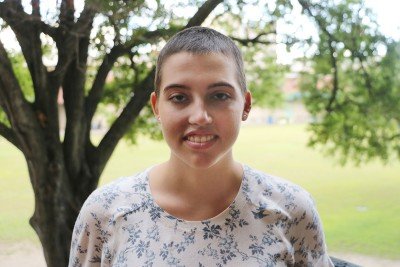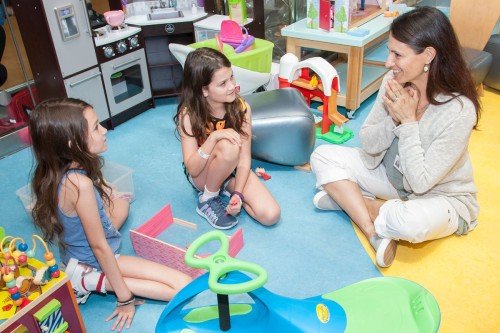What It's Like to Be a College Student with Cancer: Emma's Story
Emma Giancaterino was planning to travel the globe when she was diagnosed with a rare form of sarcoma. She came to Memorial Sloan Kettering for help and made connections through MSK's Teen and Young Adult Program. Now, Emma is healthy and thriving as a college student.

- Emma Giancaterino was diagnosed with sarcoma after high school.
- She underwent surgery at Memorial Sloan Kettering and began her freshman year at Tulane University.
- When the cancer returned, she took time off from school to undergo additional treatment.
- At MSK, Emma made friends and found support through the Teen and Young Adult Program.
- Today, she has no evidence of disease and is back at Tulane.
Emma Giancaterino was gearing up for a once-in-a-lifetime trip to Australia during her gap year after high school when she found a lump on her back. She had a feeling something wasn’t right.
“At my age no one ever thinks you have cancer, but for some reason I felt like it was more serious than what everyone was saying,” says the now 20-year-old, who is a sophomore at Tulane University in New Orleans.
When a plastic surgeon near her New York City home removed the mass, he was surprised by what he saw. Days later, Emma learned that she had undifferentiated pleomorphic sarcoma, a very rare form of cancer.
Comfort and Care at MSK
Emma’s doctor referred her to Leonard Wexler, a pediatric oncologist at Memorial Sloan Kettering. Dr. Wexler specializes in pediatric sarcomas, which are tumors of the bones or connective tissues, including fat and muscle. Pediatric sarcomas are rare, with fewer than 2,000 cases diagnosed in the United States each year. But Emma’s tumor was even rarer: Undifferentiated pleomorphic sarcoma is seen in just two dozen kids and teens across the country annually.
Dr. Wexler took an immediate liking to his patient.
“ ‘Quiet but with fierce determination’ best describes Emma,” he says. “She is very observant, considerate of others, introspective, and has a sweetly wry sense of humor.”
As frightening as her situation was, Emma says she felt relieved when she came to MSK.
“From the moment I got here, I felt comfortable,” she says. “The people who looked after me were just incredible.”
The first step in getting Emma back to health was surgery to take out any lingering bits of cancer in her back. MSK pediatric surgeon Michael La Quaglia performed a successful operation in January 2017. Emma had no evidence of disease and went home to prepare for college.
A Difficult Treatment Decision
Just two months into her freshman year, Emma found another lump in her back, close to where her first tumor was. Scans revealed her cancer had returned, so she flew back to New York City for another surgery with Dr. La Quaglia. Afterwards, she returned to Tulane and hoped to put the whole experience behind her.
Unfortunately, the tumor’s quick return and appearance under the microscope indicated that Emma’s cancer was aggressive. Dr. Wexler recommended chemotherapy and radiation treatments, but said she could opt out of chemotherapy if she preferred to monitor her disease closely. Emma faced a challenging choice.
“It was really hard to decide,” she remembers. “I knew the right decision ultimately would be to do chemo because I would just worry all the time otherwise. But I just wanted to get back to school faster.”
With an eye to the future, Emma harvested her eggs with help from MSK’s Cancer and Fertility Program and forged ahead with chemotherapy and radiation.
Making Connections: MSK’s Teen and Young Adult Program
Going through such intensive treatments at a young age while her peers were having formative college experiences was tough on Emma. Still, she grew close with her care team, including MSK nurse practitioner Jessie Hillsberg, who cared for Emma while she went through treatment.
“Emma would always laugh as I announced her presence in the hallway like a basketball star entering the arena,” Ms. Hillsberg remembers. “We created a great rapport. Her resilience really got her through treatment. We were there to guide her, but she did it all on her own.”
Emma made another important connection while in the hospital: Jenny Solomon, an acting coach who uses theater techniques to help children and adults cope with cancer. Ms. Solomon understood how isolated Emma felt and encouraged her to check out MSK’s Teen and Young Adult Program (TYA @ MSK), which caters to MSK patients ages 16 to 30.
At first, Emma was hesitant to visit The Lounge, where teens and young adults can hang out between treatments.
“It was a new environment, and being vulnerable is hard,” she says.
But Emma quickly found herself comfortable in the space. The Lounge is equipped with plenty to keep young people’s minds off cancer treatments, like video games, books and magazines, crafts, and lots of snacks and drinks. The Lounge also holds special events, like game-watch parties and meditation classes.
“The Lounge is an excellent place for young adult patients to see that there are other young people going through similar experiences,” says Amanda Kohalmi, who runs TYA @ MSK programming with fellow Teen and Young Adult Program Coordinator Jordan Patinkin. Emma developed close relationships with Ms. Kohalmi and Ms. Patinkin and to this day uses TYA @ MSK’s social media platform, The Lounge App, to stay connected with them.
“Being diagnosed with cancer in your teens and twenties is especially trying in the age of social media,” Ms. Kohalmi adds. “Our patients are forced to put their plans on hold while their friends post the most polished versions of themselves online. This community allows our patients to connect with and rally around each other.”
Ms. Patinkin and Ms. Kohalmi agree that Emma left a positive mark on every person she encountered in The Lounge.
“I always enjoyed hearing Emma’s stories and seeing the world through her perspective,” Ms. Patinkin says. “Despite setbacks, she remained positive and optimistic about going back to school and traveling. That attitude, partnered with her ability to easily talk with others and instantly make them feel comfortable, helped her to connect here.”
The Lounge became a safe space for Emma to get back to being herself.
“I never felt like a patient there,” Emma says. “It felt like a college lounge.”
A Fresh Start Beyond Cancer
Emma finished treatment in May 2018. That summer, she took chemistry courses at Columbia University in New York City to catch up with her peers. She hopes to earn a degree in neuroscience when she graduates in 2021.
Dr. Wexler is thrilled for his young patient. He says a thank-you card he received from Emma was “one of the most beautiful and heartfelt notes I have ever received.”
In August, Emma returned to New Orleans to begin her sophomore year at Tulane. Inspired by her own experience, Emma began volunteering with Imerman’s Angels, a group that connects people with cancer, and is in the process of becoming a volunteer at the New Orleans Children’s Hospital.
“The volunteers at MSK made such a difference for me,” she says. “I hope to be a very impactful and useful volunteer since I can bring a unique perspective.”
Despite her challenges, Emma says her experience gave her a new outlook on growing up — which she’s doing on her own terms.
“I think age and progression are put on a pedestal,” she says. “We’re always taught to reach for more, but everyone progresses in their own way. You don’t need to do everything right now. You’ll end up where you need to be.”





